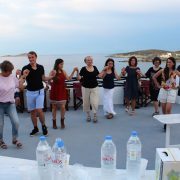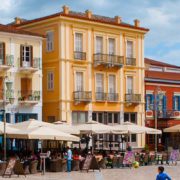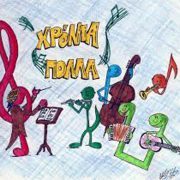March 25th: A Greek National Celebration and Independence Day. Greece has lived through major historical events and the country was involved in many wars: Persian wars, the wars of Alexander the Great, etc. In modern Greek history, from 1821 till of today, two major wars Greece was involved in, were the Greek War of Independence against the Ottoman Empire and the 2nd World War. Every year, Greeks remember these historical events with the celebration of two national anniversaries on October 28th and March 25th.
The Greek War of Independence – A little bit of history
The Empire of Byzantium ended in 1453 when its capital, Constantinople (now called Istanbul), fell to the Turks.
Since then, Greece was under Turkish Muslim rule, and for the next 400 years, deprived of their human rights.
Over the years, many attempts were made by the Greeks to gain their freedom, but they were unsuccessful.
From the 18th century, Greeks living or studying abroad got more organized and dreamt of the liberation of the Greek people and the creation of the New Hellenic State.
Finally, the Greek Revolution, or also known as “Greek War of Independence”, took place between 1821 and 1830. Greece was gradually liberated.
In 2021 Greece celebrated the 200 years of Independence. Read more about this celebration and the special song in the article below;
The Hellenic State
The first Greek state was founded in 1828 under the name “Hellenic State” and consisted of the Peloponnese and part of Central Greece.
The first governor of Greece was John Kapodistrias who cut Greek coins, founded schools and orphanages and generally tried to help in the development of economy and education.
Note: Kapodistrias is greatly honored in Greece till of today;
also the Greek euro coin of 20 cents bears his face, as did the 500 drachmas banknote of 1983–2001, before the introduction of the euro.
(if you are interested to read more about the Drachmas and euro, then click here)
The Greek National Anthem
The Greek national anthem was written by Dionysios Solomos, a Greek poet from Zakynthos, in 1829.
Click here to listen to the Greek national anthem and read the lyrics here below
| Ύμνος στην ελευθερία
Σε γνωρίζω από την κόψη Του σπαθιού την τρομερή, Σε γνωρίζω από την όψη Που με βία μετρά τη γη.
Απ’ τα κόκαλα βγαλμένη Των Ελλήνων τα ιερά, Και σαν πρώτα ανδρειωμένη, Χαίρε, ω χαίρε, Ελευθεριά! |
Hymn to Freedom
I recognize you by the fearsome sharpness, of your sword, I recognize you by your face that defines the land (i.e. the land’s borders).
From the sacred bones, of the Hellenes arisen, and valiant again as you once were, Hail, o hail, Liberty!
|
Double celebration
March 25th, 1821 is regarded to be the starting day of the Greek Revolution, although according to historical evidence, the revolution against the Turks had begun earlier.
The choice of this day is not accidental. The revolution was associated with an important celebration of the Greek orthodox church: The Annunciation of the Virgin Mary.
How do Greeks celebrate March 25th today?
March 25th is an official public holiday in Greece and Cyprus. In most Greek cities, it usually includes parades and other festive events.
The main events are the military parade in Athens in the morning of March 25th, as well as many school parades all over the country.
On March 25th it is also a tradition to gather with family and friends and eat fish. Since this day is also a religious celebration, and it always falls in the “fasting period” before the Easter celebration, most people will avoid eating meat. That’s why the traditional menu for March 25th, is the so called “bakaliaros me skordalia”.
It is fried cod accompanied by a strong garlic sauce. Delicious!

In the mood to learn more Greek, while learning about the Greek culture, for every language level in Greek?
Then our Greek eBooks and Publications, are exactly what you are looking for.
Of course, if you prefer to visit Greece and learn Greek in the country it is spoken, you are very welcome to join our courses in Greece, where we focus on speaking Greek and the daily language.









